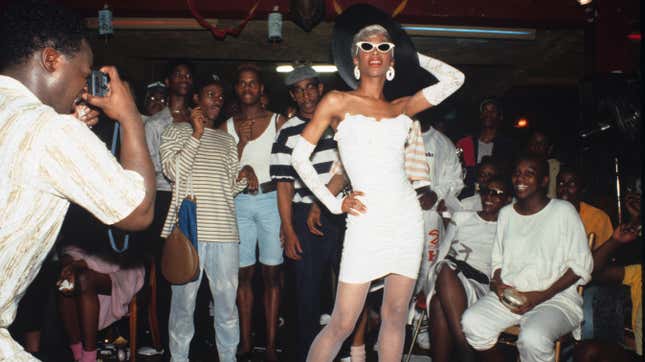The 'Wicked Beauty' Who Walked With the Icons
In Depth
Image: (Photo by Catherine McGann/Getty Images)
“This is me, you understand?” Octavia St. Laurent declares triumphantly to the camera. “I love myself for who I am, what I am. I’m beautiful, I’m talented, and there’s no woman who can stand out there next to me. And if they can? Bring it on down.” Thirty years on, and there hasn’t even been a contender.
I’m watching Queen of the Underground, the 1993 documentary about New York City superstar Octavia St. Laurent, later Octavia St. Laurent Mizrahi, whose legendary status was catapulted into the national consciousness by the questionable work of filmmaker Jennie Livingston and her documentary Paris Is Burning. In the now-cult classic, Livingston invaded the Harlem drag ball scene, where primarily drag queens and gay men and transsexuals and more staged a grand performance of gender and defiance. Critics applauded her, colleges included it in curriculums on gender and sexuality and filmmaking, and in total, Miramax and Livingston raked in $4 million dollars from its release. According to reports, only $55,000 of that was distributed back to 13 performers based on time spent onscreen. In the years since its release, Livingston’s subjects were not quiet about the often exploitative nature of her work. (Livingston, meanwhile, still disputes the more modern interpretation that her film was “for white people,” as she told Vanity Fair in 2019.)
Throughout the film, St. Laurent describes her dreams, which include vaginoplasty and money. “I want to be somebody,” she tells Livingston. “I mean, I am somebody, I just want to be a rich somebody.” Around her apartment are scattered clippings of the womanhood she’s built for herself. Magazine tear-outs of Marilyn Monroe and Diana Ross and the Supermodel Trinity: Naomi Campbell, Linda Evangelista, and Christy Turlington. Laurent admits it’s “wicked beauty” that she wants in life.
-

-

-

-

-

-

-

-

-

-

-

-

-

-

-

-

-

-

-

-

-

-

-

-

-

-

-

-

-

-

-

-

-

-

-

-

-

-

-

-








































